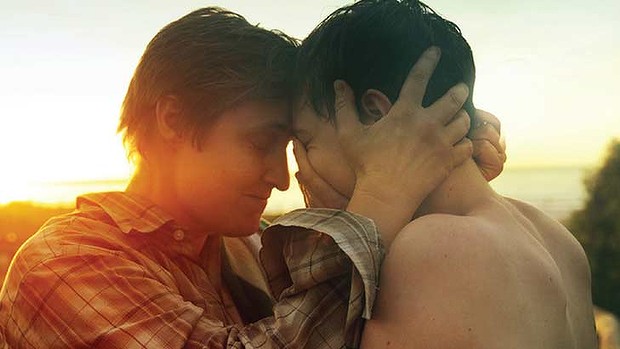Every storyteller learns the paradox that formal limitation can unlock creative freedom. One of the internet’s great gifts to the artist is the abundance and variety of opportunities for such formal experiments, be they twitter’s 140-character restraints, pic-a-day tumblrs, or daily gratefulness blogs. In many ways the internet is a great documentary experiment, turning us all into folk autobiographers, tracking our own development in cautious steps like miniature Michael Apteds. Its effects on how we understand narrative structure are only just beginning to trickle down to literature and film.
Adelaide director Sophie Hyde began making films as a documentarian and devised the formal experiment that is 52 Tuesdays before she had a story. Filmed only on Tuesdays for a year with a small cast of collaborators, it follows the relationship between 16-year-old Billie (Tilda Cobham-Harvey) and her mother (Del Herbert-Jane), who reveals a long-held desire to undergo gender transition. Jane’s decision to become James means that Billie must move out to live with her father for a year, and the two negotiate to see each other every Tuesday after school. Written as it was filmed, viewers see the Tuesdays happen in the sequence in which they were recorded; the cast, all non-professional, were handed the script each week, sometimes mere hours before filming. By adapting non-fiction techniques to fiction, Hyde’s structural choices enable the film to develop as a collaborative process. These limitations open up deep reserves to tell a very intimate, challenging and profoundly moving story of a family in transition.
The need to mark out space to change within the close but fraught parent-child relationship between Billie and James becomes the axis of the film. As James delights and despairs in the possibilities and limitations of his transforming identity, Billie begins to undergo her own sexual awakening, first as voyeur, then as researcher and documentarian, and finally as a participant in a three-way teenage relationship experiment. She’s assisted in this by her freewheeling uncle Harry (an energetic Mario Späte) and by the distractedness of both of her parents.
It’s a truism of coming out that one undergoes a second adolescence, learning to uncover and express desires that have been shamed into submission by heteronormativity. This is doubly true for many transgender experiences. New identities challenge relationships. The introduction of hormones can often parallel the biology of adolescence, creating strain on relationships and the embodied sense of self. People making a profound change to themselves can become selfish. At the same time, parents of teenagers can be overworked and indecisive about boundaries; carers, especially mothers, can come to resent their own sacrifices. This is true of all families, not just queer families. But queer families must work harder at making sense of these pressures outside a ready-made structure.
The formal limits and understated suburban locations of this film – apart from a few anomalous vox pop scenes in San Francisco, it’s shot entirely in Adelaide’s west – allow it a great deal of security to explore. Hyde subtly opens wounds, confessions, and resentments to uncover the grand experiment of becoming, whether at sixteen or while peering over the precipice of the empty nest. Hyde manages to avoid tweeness by going after emotional risk at every turn. It’s an extraordinary cast for this, in terms of what they are able to reveal; in many ways that revelation functions like the most intimate documentaries, unfolding slowly over time. Cobham-Harvey’s relationship with the camera is partly due to this directorial intimacy, and partly due to her own incredible poise and it’s no surprise to discover she trained in circus.
The emotional risk is rarely heavy-handed, and there are scenes in 52 Tuesdays that impress with subtly demonstrative power. Harry teases James after top surgery, when he’s unable to lift his arms to fight back or help himself: siblings show their love with conflict. A motley group discusses who the emergency contact might be in the hospital corridor: family is always shifting. James holds a towel up for his daughter as she changes a tampon at the beach: the casual solidarity of the mother-daughter bond is not lost. Each Tuesday is punctuated by a snippet of news footage: radical change happens at the interpersonal, as well as the geopolitical level.
It’s rare to see a film that depicts a young woman motivated by her own sexual curiosity, and it becomes a joy to watch Billie working her desires out with such investigative courage. That Billie’s adolescent explorations make the drama of James’ transition seem ordinary is in itself a radical gesture. Billie and James have more in common than either of them realise. Of course, the kids fuck it up – who doesn’t? – but 52 Tuesdays’ triumph is in its nonjudgemental expression of love as a process. This is life in all its messy beauty: everything is negotiated, as much by trial and error as by principle.
Despite collecting a spate of international awards since first appearing at Adelaide Film Festival in October, it’s all too easy for this kind of independent Australian film to disappear from our screens. Nonetheless, once seen, this one becomes impossible to dislodge from the mind. 52 Tuesdays builds the kind of trust with the viewer that inspires deep self-examination and deep loyalty. In its pattern, we all become participant-observers, pressed closer to figuring out the grand, polymorphous, collaborative experiments we’re living.



